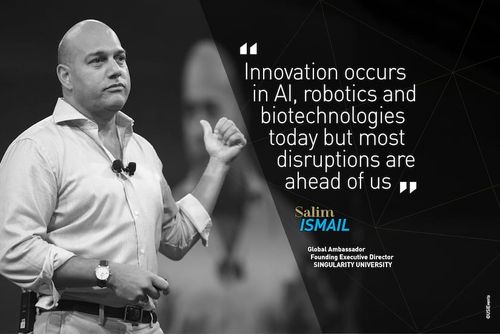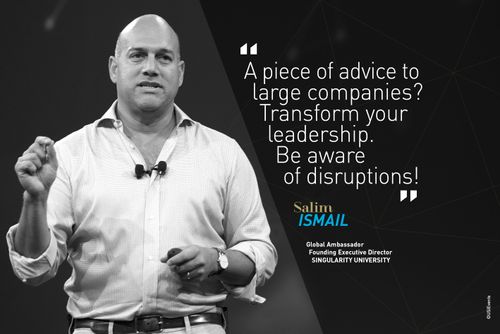Salim Ismail - Spreading the Word on Exponential Organizations
Exponential organizations (ExOs) are upending global economy.
Some of these new companies will use their command of technology to provide solutions to global issues, influencing billions of people in the years to come. Salim Ismail discusses the potential impact these ExOs could leave in their wake.
Altering lifeforms by splicing jellyfish and cat DNA; developing a program capable of outsmarting a dozen doctors, delivering drugs or food using drones… From AI to robotics, nanotechnology to energy and IT, technology spans disciplines to reach a widening array of fields. And it is moving at breakneck speed.
Democratize innovation
Ismail warns: “We are digitizing the world, and by 2030 data traffic will increase by 50%”. Singularity University strives to set moral and ethical boundaries for new technologies to serve as a guide for future leaders.
Information, once the rarest of commodities, is now so abundant that it is edging towards exponential. We are well on the way to becoming the society of the future – the transformation is happening fast – but when a society goes digital, it has to face a deflationary economy.
Take the robot Baxter, for instance: Baxter uses a visual recognition system that lets it move objects around without prior programming. It takes 5 minutes and $22,000 to train Baxter, the employee that “doesn’t join a union and never takes a break”, says Ismail.
The most expensive part of Baxter the robot is its arm but Saul Griffith, of Otherlabs, is working on a $35 version. This stark decrease in cost reflects what is happening with other innovations, like the Google Car. The sensors in the Google Car used to cost around $300,000. A second version was equipped with $75,000 sensors that are now priced at around $1,000.
DNA sequencing has undergone the same phenomenon, toppling from $3 billion to just $1,000. Since prices keep dropping, more people can afford these innovations. More access means democratization of the most advanced technologies.
Open source and sharing economy
However, as Ismail puts it: “everything is built for the world of yesterday, not of today. Society needs reorganizing.” Companies today are faced with a deception in linear growth vs exponential growth when at the junction of both curves.
It can be tough to make accurate predictions in an exponential company. Airbnb, with its 500,000 listings occupied a night, is a perfect example: Who would have thought the world’s largest hotelier wouldn’t own a single hotel? Collaborative consumption transforms the user into the source of both supply and demand, which deeply impacts the marketplace. As Ismail puts it, “Internet, and online marketing, have driven down the cost of demand for the first time.”
Another unavoidable disruption comes from Bitcoin which, by decentralizing authentication, has made banks obsolete. “Food, energy – everything runs like software and it’s time we rethink all of it.” To illustrate, Ismail uses Soylent, the New York startup created by a developer. Soylent sells full and balanced meal-replacement beverages that is said to meet all human nutritional requirements. Rather than copyrighting their formula and collecting royalties, Soylent made its formula open source.
On the business end, David Rose, the CEO of Gust, thinks that “any business built to succeed in the 20th century is destined to fail in the 21st.” The ten-fold performances of ExOs make it gospel.
Disrupt
The success of ExOs draws on their many strengths: massive transformative effects, radical breakthroughs that have widespread benefits for humanity, positive outcomes for millions of people, inventions made possible, ideas that are just begging to be shared, and a sunny outlook. Among the external attributes of ExOs, of which autonomy is crucial, are on-demand personnel, a strong community, algorithms, activists, and investment, but also experimentation (naturally) and a dashboard.
To draw inspiration from ExOs, we must “transform leadership, invest in and partner with adjacent exponential organizations, and profit from data or explode them.”
As Ismail says, “You’re either the one who disrupts or the one who is disrupted.”


